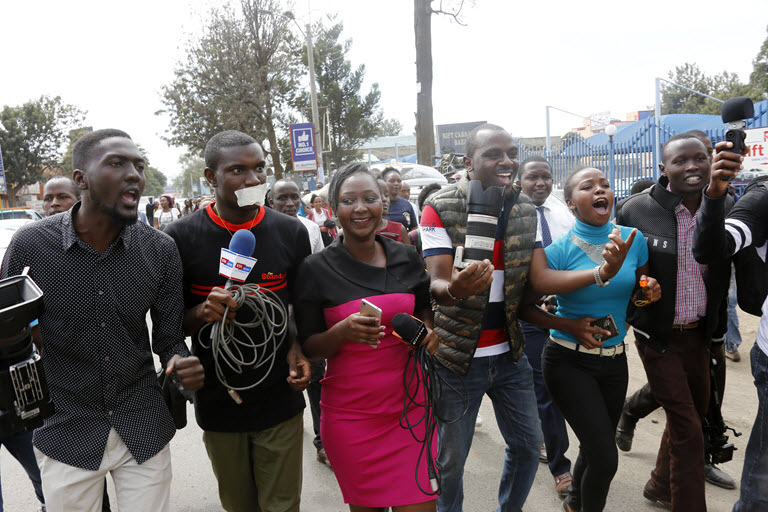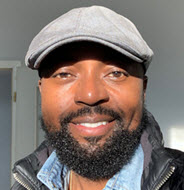Uganda fell behind, whereas Kenya improved its press freedom ranking in the Reporters Without Borders 2022 Press Freedom Index. And after years of media freedom decline, Tanzania appears to be on the right track. But overall, media freedom activists say there is still work to be done.
“First, let me say I am sorry for the harassment, suppression, imprisonments, and even deaths that journalists face. But the good news is that such incidents are decreasing,” Tanzania’s President Samia Suluhu Hassan told reporters and media stakeholders as the world marked Press Freedom Day.
It was the first time in Tanzania’s history that the East African nation played host to a momentous day for journalists in Africa.
According to the Reporters Without Borders (RSF) 2022 Press Freedom Index, Tanzania is ranked 123 out of 180 countries. In 2021, RSF ranked the East African nation at position 124. Though minimal, Tanzania has improved one rank.
Nonetheless, RSF states that being a journalist in Tanzania is a precarious calling. Reporters are underpaid, and the government – which provides the biggest chunk of revenue to media outlets through ads – “punishes those that stray from its line.”
President Samia reiterated that her administration had made considerable strides in opening up and improving media freedoms since mid-March 2021, when she took office following the death of President John Pombe Magufuli.
She also vowed to continue dialogue with all relevant partners to reform Tanzania’s media laws.
Tanzania: Press freedom improvement
“Since Samia Suluhu Hassan became president in March 2021, the Committee to Protect Journalists (CPJ) has noted several improvements in the press freedom climate. These include the February 2022 lifting of bans on four publications,” CPJ’s Sub-Saharan Africa representative, Muthoki Mumo, told the EAST site in a written statement.
She said many [Tanzanian] journalists told CPJ they now feel safer doing their work. However, Ms Muthoki also noted:
“There continue to be reports of journalists arrested while doing their jobs, including as recently as February. Of great concern is that even under President Samia’s government, restrictive media laws continue to be used to the detriment of the press. Last year, CPJ documented the two-week suspension of Uhuru newspaper and the month-long suspension of Raia Mwema newspaper, both accused of breaching a 2016 law, the Media Services Act,” Muthoki said. She stressed that the specific law was deemed inimical to press freedom by the East African Court of Justice in 2019.
Nevertheless, President Samia’s attitude towards the press is the opposite of her predecessor, the late John Pombe Magufuli, who critics accused of cracking down on dissent and shutting down independent media.
Press Freedom Comes with Responsibilities, says Samia
“Tanzania respects the freedom of the media and that comes with responsibilities. The media is crucial to the development of society but must play within the laws established and must help the African governments achieve their objectives,” President Suluhu, the chief guest and keynote speaker during the event, said.
This year’s United was sponsored by the Nations Educational, Scientific, and Cultural Organization (Unesco) with the Theme Journalism under digital siege.
While the rest of Africa converged in Tanzania for the event, Uruguay hosted the WPFD at a global level.
President Suluhu said supporting the African media is indeed a step towards the right direction with the ultimate goal of making Africa and African media tell its own story.
She said Tanzania will review unfriendly media laws to ensure that Tanzanian media enjoys its space but with a caveat that until that happens, the media must obey the laws in place.
Uganda’s deteriorating press freedom
Uganda was the worst-performing nation in East Africa as far as press freedom is concerned. It fell seven places to occupy position 125 out of 180 countries.
The Reporters with Borders report blamed President Yoweri Museveni for cultivating a climate of fear for journalists. In 2018, he referred to journalists as “parasites.”. “CPJ has also previously expressed concern that past anti-press rhetoric by high-level government officials, including President Yoweri Museveni, creates a hostile environment in which security personnel feel that they can attack journalists at will,” Muthoki said.
State-sponsored attacks
According to the RSF report, journalists in Uganda face threats and violence, and security agents regularly attack them. CPJ has also documented repeated physical attacks by police and military officers on the press, Muthoki said, adding: “Journalists are particularly vulnerable when covering members of the political opposition.”
The RSF report also accused Ugandan authorities of routinely intervening directly in the broadcast of some TV reports and, in some cases, calling for such reports to be dropped from programs.

In addition, in 2019, police raided three private radio stations to cut short interviews with an opposition politician.
Kenya makes steady progress
At position 69 out of 180, Kenya emerged as the best ranked East African country. In 2021, RSF placed East Africa’s arguably biggest economy in position 102 of the press freedom index.
“While Kenyan journalists operate in an environment of relative freedom, compared to some of their counterparts in the East Africa region, they still face certain difficulties that constrain their reporting,” CPJ’s Muthoki said.
“For instance, the 2018 Computer Misuse and Cybercrimes Act contains provisions that criminalize speech on overly broad grounds,” she said, pointing out that the law gives authorities the power to set themselves up as arbiters of what is “true” and “false” with dangerous implications for freedom of the press.

Before it became law, CPJ raised concern that the Computer Misuse and Cybercrimes Act would be used to gag journalists and that segments of it seemed calculated to introduce criminal defamation, previously struck down by Kenyan courts. Ever since the law was passed, reports by digital rights groups and by the press show that bloggers and people posting content on social media are among those who have been targeted for arrest and prosecution under this law. Journalists have also been targeted directly by threats and physical abuse. For example, In April 2021, CPJ documented the police harassment of Citizen TV journalists after they published an expose on illegal trade in firearms.
“CPJ is concerned by recent reports that journalists reporting on election campaigns have been physically assaulted and calls on authorities to ensure a safe and free environment for the press ahead of the [2022] August 9 polls.”
The RSF report further stated that politicians or people with close ties to the government own many media outlets.
The Kenyan authorities can influence the appointment of media managers and editors and those in charge of the media regulator, which is depicted as independent but is directly dependent on the government. As a result, self-censorship is encouraged by the government’s strong presence.
Moses Mutente contributed to this article
 Chrispin Mwakideu
Chrispin MwakideuReport by Aga Khan University’s Media Innovation Centre analyses the country’s millennials and digital natives’ media consumption habits.
For the media to flourish, and the society to have free flow of accurate and verifiable information, journalists, the drivers in the passing of information are expected to be well grounded in laws and the legal aspect pertaining to the job, writes Alfred Ganzo.
Pitching provides numerous opportunities for your new or existing business ideas to be discovered and realized; and as Simon Mtabazi writes, some startups have become billion-dollar companies due to efffevie pitches
The success you achieve with your media startup business will heavily rely on your reputation as a trustworthy company, and as Nandi Mwiyombella writes, it will also open a new window for customers and potential investors.
That’s why I think today is such a great space for us to sit back and reflect on the questions that could help us shape the kind of journalism that we want to see in our local and global community.
The report specifically analysed eight major variables which include: newsroom structure and resources, media ownership and business models, organisational capacity, innovation culture, journalism culture, financial trends and results, content quality and COVID-19.
Mudi, in her role as Media Council of Kenya regional coordinator in charge of Mombasa(covering the entire coastal region), has found herself at the forefront in advocating and fighting to protect journalists’ rights, culminating in her being awarded for her peace efforts in the run-up and during the 2022 general elections in Kenya.
The 2022 general elections have been mentally draining for journalists, some of whom have had to stay on the campaign trail for over a year. Others have had to toy with the tough call of managing teams in the newsroom. East Site’s Isaac Swila and political writer Rawlings Otieno recount their experiences
What role did social media influencers play in the election? What voice did they give in political discourses during and around the election period? And to what extent did political candidates involve the influencers in marketing their manifestos to sway votes in their favour? East Site writer Steven Omondi unpacks the details
The media industry is experiencing enormous transformation as new digital trends emerge. With the vast opportunities that the digital space offers, media owners and content producers must deliberately adapt to how the audience consumes content.
With the increased Digital Technology at the palm of just anybody; there are a lot of information that distort whether deliberately or not highlighting the need of robust Fact0checking as Asha D. Abinallah explains
Is there a danger in media personalities having a vibrant social media presence? Assuming they have a massive media following, should they self-regulate and filter what they post? And when they engage with followers, should their opinions be taken as personal, or does it represent the journalist’s media house? East Site writer Isaac Swila explores
Media stakeholders are raising concerns over the lack of gender-inclusive reporting in East African newsrooms. They want concerted efforts to ensure more female journalists get equal opportunities like their male counterparts.
The partnership will also ensure that local content is curated and distributed to better optimize the product and meet the needs of Kenyan online users.
The news industry is constantly changing, and in the last few years, User Generated Content (UGC) has become a ubiquitous feature in news sourcing and packaging. However, media houses and journalists need to establish verification and credibility safeguards to avoid the misinformation trap.
Reporting on elections is, for many journalists, an opportunity to establish themselves as reliable political reporters. But the task comes with certain risks, particularly in the East African sub-region.
Stakeholders are now calling for concerted efforts, better planning and preparations for journalists before they are sent out on the field to cover Kenya’s high-stakes August 9 General Elections.
East Africa’s media grapples with a myriad of challenges whenever general elections approach. Not only do editors struggle with balancing the competing political interests, at times at the altar of professionalism, but individual journalists pay dearly, many suffering attacks in the course of their duties.
As Form One students settle into a new life in secondary school, this has also been a period of reflection. We have read tear-jerking and heart-warming stories of determined students who overcame many odds to get an education and how well-wishers came together in their aid.
There is renewed optimism in the Tanzanian media space following the ascension to power of President Samia Suluhu whose regime is keen to relax some of the laws deemed punitive to journalists and media houses
A free and independent press is the cornerstone of any democracy and the foundation of economic success, mostly because through our free press, we’re able to hold the leadership to account.
To align with the changing times and stay relevant in the business, media houses are challenged to rethink their strategy and to adopt and understand obstacles and challenges they face towards rethinking and exploring alternative sources of revenue and on developing the digital strategy.
A team of young, Tanzanian tech-savvy communication professionals is dreaming big. It seeks to usher a new dawn in media business management in Tanzania by optimising employee output and offering consultancy to media businesses on how they can operate with a minimal budget but still attain their goals.
Bloggers and influencers have become an integral component of information sourcing across East Africa. The public uses blogs, privately run websites and social networks to crowdsource information from social networks, which they then publish and distribute. But it’s not all rosy for this group of content makers.
The chances of meeting a medical graduate practising journalism are usually very slim, especially in Sub-Saharan Africa. But two Tanzanian physicians have broken away from that norm by inventing a start-up called Afyatoon. It uses visual art technology to tell compelling medical stories. They narrate to the EAST Site their experience and share their vision for the future.
Did you know that in 2021 Kenyans watched less TV and spent more time on social media? Or that some Kenyans rely on family, friends, or even social media icons and bloggers as a source of news and information? These are some of the conclusions highlighted in the 2021 State of the Media Survey conducted by the Media Council of Kenya (MCK).
The effects of the Covid pandemic continue to change the world in ways we had not imagined possible. The media is going through a painful transformation to keep up with changing production, distribution and consumption habits. In East Africa, Uganda’s Media Challenge Initiative (MCI) recently hosted a panel discussion on Media Viability comprising experienced journalists from Television, Radio, Print and Online/Digital media to address lessons learned from the pandemic. East Site’s Moses Mutente attended the panel and compiled this article.
In this commentary, Uganda-based journalist Caleb Okereke shares deep personal insights into why media schools in East Africa must rethink their curriculum. He stresses the need for trainers to begin teaching media ownership to better equip journalism students for the dynamic and cutthroat job market by taking us through his journey as a journalism student and media owner.
For the second year running, a survey commissioned by the Media Council of Kenya shows that the trust level in Kenyan media has nosedived, raising fundamental questions on how media will play its watchdog role more so with landmark elections set for August 9. EAST Site writer Isaac Swila explores.
Legacy media is currently caught between a rock and a hard place — the Covid pandemic and the rise and proliferation of social media has hit revenues hard. Some say this could signal the end of news as we used to know it. However, Ugandan decorated journalist Ernest Bazanye believes the industry will survive and thrive, but not without a fight.